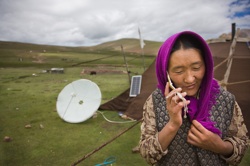Human and Environmental Security
 The Secure World Foundation focuses not only on keeping space sustainable but also on maximizing the efficiency and effectiveness of using space for the benefit of humankind.
The Secure World Foundation focuses not only on keeping space sustainable but also on maximizing the efficiency and effectiveness of using space for the benefit of humankind.
Space and Human and Environmental Security
Space systems, including position, navigation and timing (PNT), Earth observation and telecommunications satellites, provide significant benefits in support of human and environmental security for a wide variety of human and environmental concerns:
- Protecting biodiversity
- Guiding firefighters and emergency responders
- Tracking and mapping outbreaks of vector-borne diseases
- Assessing and managing freshwater resources
- Monitoring and reporting suspected human rights abuses
- Understanding and responding to space weather events
- Identifying and tracking potentially hazardous Near-Earth objects
- Supporting natural disaster-risk modelling
- Evaluating the impact of environmental policies
- Improving long-term forecasting capabilities
Challenges to Obtaining Maximum Benefit from Space Systems
The full utility of these important systems can be blunted by a variety of institutional, policy, educational, and social barriers. As a result, benefits from these systems do not always adequately reach decision makers or ordinary citizens when they need it most.
What is SWF Doing to Enhance the Benefits of Space?
SWF brings together disparate communities - technical, legal, policy - to find ways to improve the use of space systems for human benefit and to develop collaborative measures to address shared challenges.
Facilitating Dialogue and International Cooperation
- Natural and human-caused disasters call for an efficient, coordinated response to improve the delivery of space-derived information and services in a timely manner, and to understand and manage risks before disasters occur.
- SWF actively participates in international forums advancing data democracy, international cooperation, and collaboration between geospatial information providers and users, including the Committee on Earth Observation Satellites (CEOS), the Group on Earth Observations (GEO), and the United Nations Platform for Space-based Information for Disaster Management and Emergency Response (UN-SPIDER).
- SWF has been instrumental in the development of international mechanisms for coordinated communication, planning, and response to Near-Earth Object (NEO) impact hazards and risks. The establishment of the International Asteroid Warning Network (IAWN), and the Space Missions Planning Advisory Group (SMPAG) in 2013 indicate concrete advancements toward planetary defense as an international and shared responsibility.
Promoting Ways to Increase the Effective Use of Space Assets
-
SWF focuses on finding new ways to advance the effectiveness of space-derived information and services to improve decision making. As part of this work, SWF has supported capacity-building workshops in developing countries to assist disaster management practitioners in preparing for and responding more effectively to natural disasters.
-
SWF draws on lessons learned from these and other partner efforts to promote the exchange of best practices and to examine how policy, regulatory and legal mechanisms can address persisting challenges in expanding the use of these resources.

 Share
Share